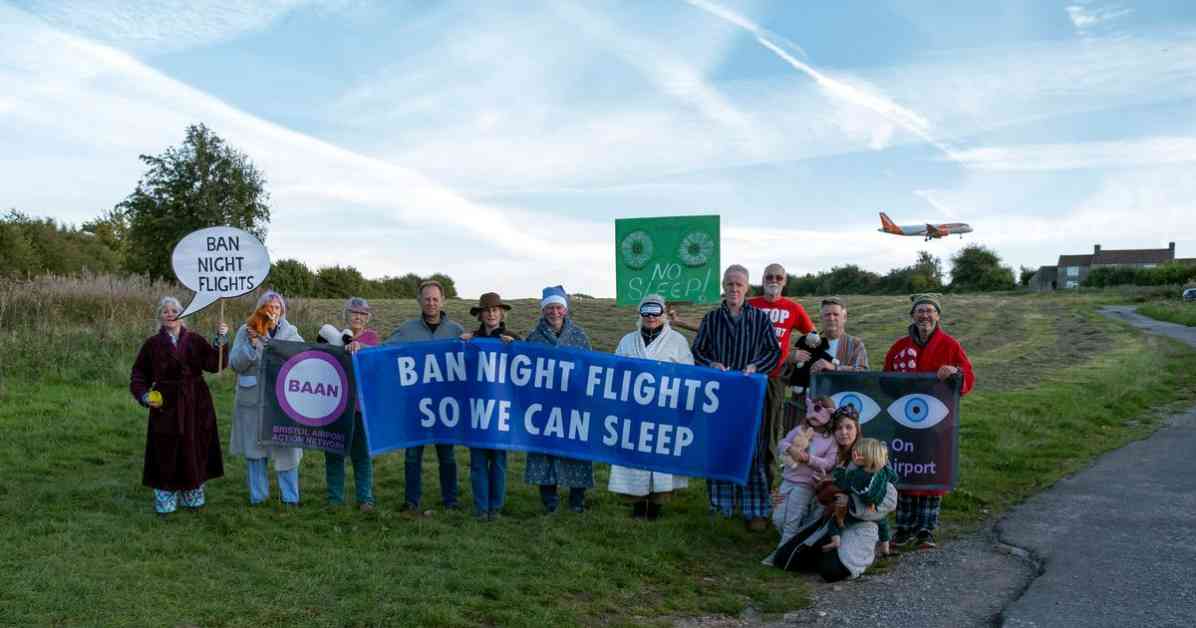Local residents in Bristol have united to voice their concerns and protest against the disruptive late-night flights coming from Bristol Airport. The community has expressed outrage over the constant noise and disturbance caused by planes flying overhead throughout the night, leading to various medical and mental health issues for those living near the airport.
Protesters gathered on Friday night, September 13, at the A38 roundabout outside of Bristol Airport to make their voices heard. Members of the Bristol Airport Action Network (BAAN) showed up in their pajamas, holding banners that read, “Ban night flights so we can sleep.” The demonstration was part of an international movement against late-night flights, with around 70 protest groups from different countries coming together to oppose disruptive flights.
Stephen Clarke, a member of BAAN, emphasized the solidarity among residents worldwide who are adversely affected by night flights. He stated, “From Bristol to Barcelona, from Antwerp to Amsterdam, we stand together in calling for the banning of these harmful and unnecessary night flights.” Another BAAN member, Richard Baxter, highlighted the numerous studies linking night flights to a range of negative health effects resulting from disrupted sleep patterns caused by aircraft noise.
One protester, Racheal Dodds from Dundry, shared her personal experience, stating, “Night flights are really disturbing our sleep as we are right on the flight path. Sleep deprivation is a form of torture. We need sleep to be well and healthy, to be productive, to form good communities, and to be good neighbors. This is really having a detrimental effect on our lives.” The group Eyes On Bristol Airport raised awareness on social media about the high number of late-night flights, averaging approximately 30 every night over the past three months.
Despite the existing cap on late-night flights from Bristol Airport, local residents argue that the number is still too high and have taken action to address the issue. In 2022, BAAN challenged Bristol Airport’s plans to expand to accommodate 12 million passengers annually, though the group was unsuccessful in their efforts. However, they continue to advocate for reducing the number of disruptive flights affecting the community.
In response to the protest, a spokesperson for Bristol Airport expressed uncertainty regarding BAAN’s figures and clarified that the cap on night flights is based on a specific reporting period rather than the calendar year. The spokesperson reassured that the airport operates under strict noise and environmental controls, working closely with airlines and local authorities to comply with operating limits and report all night flights and exceptions on a monthly basis.
Amidst the ongoing debate between residents and airport authorities, the issue of late-night flights at Bristol Airport remains a contentious topic. While efforts are being made to address the concerns raised by the community, the balancing act between economic growth and environmental impact continues to be a point of contention. As the dialogue continues, it is essential for all stakeholders to engage in constructive conversations to find a sustainable solution that meets the needs of both the airport and the local residents.
Impacts on Health and Well-being
The detrimental effects of late-night flights on the health and well-being of residents living near Bristol Airport cannot be understated. Studies have shown a clear link between disrupted sleep patterns caused by aircraft noise and a range of medical and mental health conditions. Sleep deprivation, in particular, has been identified as a form of torture, with severe consequences for overall health and quality of life.
Residents like Racheal Dodds have shared their personal struggles with the constant disturbances from night flights, highlighting the impact on their ability to rest and function effectively. The disruption caused by aircraft noise not only affects individual sleep patterns but also has broader implications for community well-being and neighborhood cohesion. Finding a balance between economic interests and the health and safety of residents is crucial in addressing this complex issue.
Challenges and Solutions
The ongoing debate surrounding late-night flights at Bristol Airport underscores the need for a comprehensive approach to address the concerns raised by the community. While the airport plays a vital role in the regional economy, it must also prioritize the well-being of local residents and mitigate the negative impact of disruptive flights on their daily lives.
One possible solution could involve revisiting the existing cap on night flights and implementing stricter regulations to reduce the number of disruptive flights during late hours. Additionally, investing in soundproofing measures for affected households and conducting regular noise assessments to monitor the impact of aircraft noise on surrounding communities could help alleviate some of the concerns raised by residents.
Collaboration between airport authorities, local residents, and regulatory agencies is essential in finding sustainable solutions that strike a balance between economic growth and environmental sustainability. By engaging in open dialogue and considering the perspectives of all stakeholders, a more holistic approach to managing late-night flights can be developed to ensure the well-being of the community while supporting the airport’s operations.













